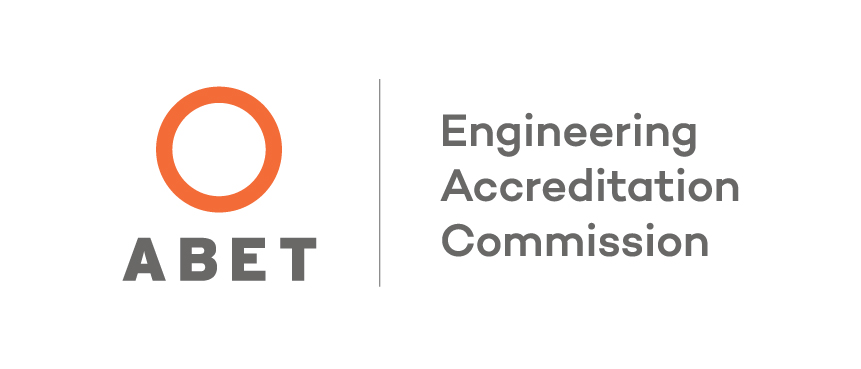Accreditation
Environmental Engineering Program

The Environmental Engineering (B.S.) degree program is accredited by the Engineering Accreditation Commission(s) of ABET, under the General Criteria and Program Criteria for Environmental Engineering and Similarly Named Engineering Programs. The ABET accreditation process, a voluntary, non-governmental process of peer review, helps assure quality in educational programs. ABET-accredited educational programs must meet certain defined standards.
Environmental Engineering Program Mission
The Environmental Engineering Program will prepare students for a career in the global, interdisciplinary field of environmental engineering and for life-long development in the profession. The program's fundamental base in biological and earth sciences and development of specific engineering application skills prepares graduates to approach unique, atypical problems with a true problem-solving approach, develop solutions to benefit society and the environment, and promote these solutions.
Program Educational Objectives
Consistent with the mission statement, graduates of the Missouri S&T Environmental Engineering Program are expected to attain within a few years of graduation:
Professional development, as evidenced by a combination of:
- Passing the FE
- Obtaining or progressing toward an advanced degree
- Holding the PE within 5 years of graduation
- Maintaining connections to Missouri S&T
- Activity in professional organizations
Technical competency, as evidenced by:
- Independently evaluating data, modeling, and performing systems evaluations
- Problem solving
- Utilizing resources
- Critiquing or reviewing others’ work
Responsibility/Leadership, as evidenced by a combination of:
- Managing project tasks with limited supervision
- Leading a team to design a system
- Critiquing or reviewing others’ work
- Mentoring new staff
- Demonstrating responsibility for:
- Time management
- Cost management
- Management of lower-level staff members
An ability to communicate effectively, as evidenced by a combination of:
- Demonstrated high quality in reports or other deliverables:
- Written reports – should be reviewed by higher-level staff member at 3 years
- Final report authorship 5 years after graduation
- Successful communication with clients and peers
- Negotiation (at 5 years) in applicable fields
- Critiquing or reviewing others’ work
- Generating standard business documents, with supervision, such as:
- Specifications (at 3 years beyond graduation)
- Comment letters (at 3 years beyond graduation)
- Proposal/request for bids/RFPs (at 3 years beyond graduation)
- Maintenance studies (at 3 years beyond graduation)
- Comprehensive monitoring evaluation systems (at 5 years beyond graduation)
- Permits, portions of permits, or permit applications (at 5 years beyond graduation)
An ability to work in teams, as evidenced by:
- An understanding of the organization mission
- Being desired as a team member by others in the organization
A big picture view of their field, as evidenced by a combination of:
- Activity in professional organizations
- An understanding of how to develop a good leader (insight)
- An ability to integrate data and find gaps
- Holding and being able to use technical knowledge
- An understanding of applicable systems (synthesis) with comprehension of data value
- At five years after graduation, an understanding of how things transfer from environmental engineering to other fields, and the ability to evaluate systems with knowledge of uncertainty included in other related areas of practice
Student outcomes
Consistent with the program educational objectives listed above, the Missouri S&T environmental engineering program graduate will have:
- an ability to identify, formulate, and solve complex engineering problems by applying principles of engineering, science, and mathematics
- an ability to apply engineering design to produce solutions that meet specified needs with consideration of public health, safety, and welfare, as well as global, cultural, social, environmental, and economic factors
- an ability to communicate effectively with a range of audiences
- an ability to recognize ethical and professional responsibilities in engineering situations and make informed judgments, which must consider the impact of engineering solutions in global, economic, environmental, and societal contexts
- an ability to function effectively on a team whose members together provide leadership, create a collaborative and inclusive environment, establish goals, plan tasks, and meet objectives
- an ability to develop and conduct appropriate experimentation, analyze and interpret data, and use engineering judgment to draw conclusions
- an ability to acquire and apply new knowledge as needed, using appropriate learning strategies

Follow Civil, Architectural and Environmental Engineering